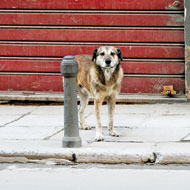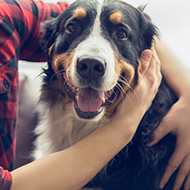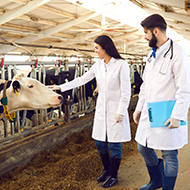FOUR PAWS and CFF aim to neuter, vaccinate and provide veterinary treatment to the stray dogs of Chernobyl.
International team will carry out neutering and vaccinations
International animal welfare organisation FOUR PAWS has joined forces with American NGO Clean Futures Fund (CFF) in a mission to help the forgotten dogs of Chernobyl.
When Reactor 4 of the Chernobyl Nuclear Power Plant exploded in 1986, it made headlines around the world. Hundreds of thousands of people living within the 30-kilometre exclusion zone were forced to flee their homes, leaving behind their pets.
Today hundreds of dogs still occupy the exclusion zone, putting the nuclear power plant workers at risk of rabies.
In a collaborative project, FOUR PAWS and CFF aim to neuter, vaccinate and provide veterinary treatment to these forgotten dogs - not just to protect the power plant workers, but also to control the stray dog population and to better the welfare of the dogs generally.
Julie Sanders, international director of companion animals department of FOUR PAWS, explains: “Rabies is not only a risk for animals but also for humans. By vaccinating the stray dogs, we are also protecting the 3,500 nuclear power plant workers who come into contact with the dogs and look after them.
"By neutering the strays, we will also achieve a long-term reduction in their population, improving the welfare of the dogs. This is important because their chances of survival are greatly reduced if their numbers increase due to lack of food and shelter in the extremely cold winters.”
After the nuclear catastrophe, soldiers were sent into the exclusion zone to shoot the abandoned pets, but many managed to survive.
“Originally, the dogs retreated to the surrounding woods after the exclusion zone was established, but packs of wolves and food scarcity forced them back to the abandoned city and towards the still-active nuclear plant. There, the workers began to feed the dogs and they have stayed ever since,” says Sanders.
CFF has put together an international veterinary team, which will carry out the medical treatment of the stray dogs of Chernobyl over the coming months. To contribute, FOUR PAWS has not only sent an experienced vet but has also provided the medicines and veterinary equipment needed to complete the project.
Ukrainian FOUR PAWS vet, Oleksander Senchuk said: “Our goal is to vaccinate and neuter 120 strays from the exclusion zone and the nearby surroundings within two weeks. In addition, we will also treat injured and sick animals. It is a very ambitious plan, but given the experience that we have accumulated over the years, we are confident that we can manage it.”
To ensure their safety, the veterinary team will follow strict health and safety protocols. As part of this, it will be mandatory for them to wear appropriate clothing to ensure they are protected from the radiation levels. Furthermore, the stray dogs of Chernobyl will be thoroughly washed and scrubbed before every medical treatment to reduce the risk of contamination.
“There is also no risk presented by the surgery and open wounds,” explains Lucas Hinson, co-founder of CFF. “The radioactive contamination of the dogs is very low so that it poses no risk to humans.”








